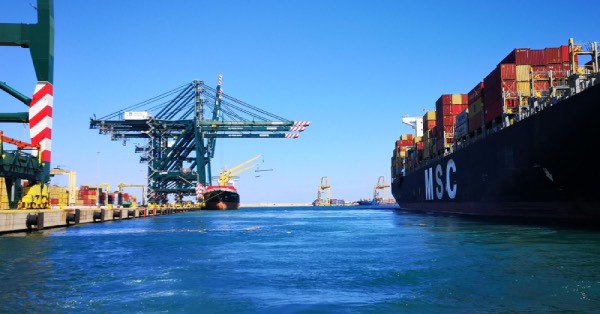- The Valenciaport Chair in Port Economics prepares the first quarterly report on the international economic situation
- The data show that the expected economic growth has not met the expectations established before the pandemic
The Valenciaport Chair of Port Economics, a joint project of the Port Authority of Valencia and the Universitat de València , has presented the first quarterly report on the international economic situation prepared by Professor Vicente J. Pallardó, economic situation analyst at the Institute of International Economics.
The report shows that the evolution of the international economy is quite uneven but, broadly speaking, the situation remains highly complex and the risks for the immediate future are clearly skewed to the downside. At the same time, the data show that expected economic growth has fallen short of pre-pandemic expectations. “In the West, most economies (but not southern Europe or Japan) will have already exceeded by the end of this year, albeit by a small margin, the level of activity they showed before COVID-19,” explains Vicente J. Pallardó. “But, also in a generalised manner, they will have lost five points or more of growth with respect to what was forecast before the pandemic”, adds the director of the Valenciaport Chair of Port Economics.
“Spain, with a loss of 7 points of GDP compared to what was anticipated at the end of 2019, is among the countries with the worst results,” notes Professor Pallardó. “The exception is the United States, whose economy would have grown more with the pandemic than without it. The explanation is given by the enormous magnitude of the fiscal and monetary injections,” argues the lecturer from the Department of Economic Structure at the University of Valencia.
Regarding the situation of the savings rate in Spain, the report points out that given the increase in the cost of living and the tightening of monetary conditions, households are facing an increasingly unfavourable scenario. In those countries, led by Spain, where additional savings have already been spent in high proportion, this could lead to a very sharp slowdown in economic growth.
This first report analyses, in 7 key points, the current international economic situation and outlines the trends for the immediate future. Inflation, monetary policies, the rise in house prices, the fall in the price of public debt, the household savings rate, the labour market and the sustainability of globalisation are the main factors addressed in this study. “The aim of the report is to provide the reader with data, ideas and perspectives that contribute to a better understanding of the current economic reality. We hope that this exercise in analysis will become a reference for monitoring international economic developments,” says Professor Pallardó.
The quarterly reports will have the same structure. First, the “Focus of Attention” will be presented, a graph analysing some of the hottest elements of the period under analysis. This will be followed by recent changes in the “International Reference Prices”, those prices that set the tone for the world economy. The main focus of the reports will be on the section “Understanding the Quarter in Seven Keys”, which will address the key issues that are crucial for understanding developments in the recent period and future developments in the international economy. Finally, the dossier will close with the section “The World in Two Variables”, which will show the trajectory during the 21st century of two transcendental macroeconomic indicators for the world economy as a whole and the differences observed between developed, emerging and developing countries.
The Valenciaport Chair of Port Economics is a project born in 2022, the result of collaboration between the Port Authority of Valencia and the University of Valencia, which aims to bring knowledge of the changing situation of the international economy and trade, and especially maritime traffic and port activity, to professionals, the media, academics, students and, in short, the whole of society interested in this changing reality. The quarterly reports on the international economic situation are part of the research activities related to the analysis and periodic monitoring of the international economic situation, trade and its maritime-port implications.









































